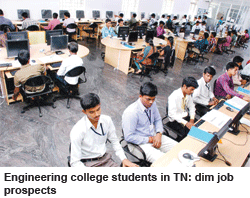For the great majority of 250,000 engineering students graduating from Tamil Nadu’s 560 engineering colleges in May this year, hopes of getting remunerative employment in the IT (information technology) industry are dimming. During the boom years of the industry (2003-08), HRD managers of IT companies descended in droves on college campuses to recruit stud-ents. But this year campus recruitment from Tamil Nadu’s engineering colleges is expected to decline by 40 percent although IIT-Madras and a handful of highly-ranked deemed universities continue to attract IT multinationals including Microsoft, Oracle, Google, offering 30 percent higher salaries. However major indigenous companies (Wipro, Accenture, TCS, Cognizant Technologies and Infosys) are not only hiring smaller numbers in the campus recruitment season (September-Febr-uary), but are restricting themselves to recruiting toppers at salaries (Rs.3-4 lakh per annum) which have been static for the fourth consecutive year.
Cautious hiring by IT companies is not peculiar to Tamil Nadu; it is prevalent countrywide, raising the prospect of nearly 50 percent of the 1.5 million graduates churned out by 3,393 engineering colleges across the country, being unemployed after graduation. According to estimates of the Delhi-based National Association of Software and Services Companies (Nasscom), the number of freshers hired by IT companies will drop by 17 percent, from 215,000 in 2012-13 to 180,000 this fiscal year. Nasscom spokespersons ascribe this to the growth rate of India’s IT industry declining to 10.2 percent in 2012-13, from 30 percent in 2008.
 Dimming employment prospects are expected to hit Tamil Nadu’s engineering graduates particularly hard as the state hosts the second largest number of engineering colleges (560) in India after Andhra Pradesh with nearly 40 percent of the 250,000 students churned out by the state’s colleges running the risk of unemployment and/or under-employment. Several comp-anies which recruited students a year ago have deferred their joining dates by almost a year, forcing many of them to take up jobs in other industries for which they are overqualified and underpaid.
Dimming employment prospects are expected to hit Tamil Nadu’s engineering graduates particularly hard as the state hosts the second largest number of engineering colleges (560) in India after Andhra Pradesh with nearly 40 percent of the 250,000 students churned out by the state’s colleges running the risk of unemployment and/or under-employment. Several comp-anies which recruited students a year ago have deferred their joining dates by almost a year, forcing many of them to take up jobs in other industries for which they are overqualified and underpaid.
“Until very recently the practice of IT companies was to recruit fresh graduates and train them in-house. But these days companies are hiring job-ready toppers to cut training costs. We are striving hard to make students job-ready through collaborations with IT firms for training students and inviting more companies to visit our campus. But despite these initiatives only 65 percent of our students have been placed thus far,” says Sivagnana Prabhu, head of training and corporate affairs of the RMK Group of Institutions, Chennai.
Knowledgable educationists in Chennai blame the Delhi-based All India Council for Technical Education (AICTE) — the apex regulatory body authorised to license all technical education institutions countrywide — for recklessly licensing private engineering colleges in Tamil Nadu during the past decade. To the extent that their number has risen from 237 in 2005-06 to 560 in 2013-14 even as industry’s demand for engineers is tapering off due to the declining growth of the IT industry and the economy in general. Moreover AICTE has failed in its primary duty of supervising the quality of education dispensed in licensed colleges, most of whom are staffed with inexperienced temporary faculty and lack research and development facilities.
To compound the problem, in the academic year 2007-2008, the M. Karunanidhi-led DMK government scrapped the common entrance test for admission into engineering colleges, and in the academic year 2010-11 it lowered the admission eligibility marks in the class XII exam to 50 percent for students in the general category and 40-45 percent for backward classes, to fill excess capacity. The consequence is a host of poorly equipped engineering colleges brimming with students ill-qualified for technical education. According to a recently released National Employability Report (NER) 2011, compiled by Aspiring Minds, a private employability assessment company, only 10 percent of engineering graduates from the state’s colleges are adequately qualified for employment in reputable IT companies. The survey conducted across 16 states, places Tamil Nadu at the bottom of the list together with Maharashtra and Andhra Pradesh, lending credence to the argument that states with the highest concentration of engineering colleges sacrifice quality for quantity.
“Slowing industrial growth and the economic downturn have adversely impacted recruitment. This year we have recruited only 5,000 students from colleges in Tamil Nadu — half the number recruited last year. Most graduates of second tier colleges with poor infrastructure and faculty lack the minimum technical knowledge and communication skills. Therefore we have restricted hiring to only the best students of best institutes in the state,” says a senior executive in the placement division of Tata Consultancy Services, Chennai.
Clearly a shakeout — mergers, acquisitions and perhaps sellouts and closures — is imminent in Tamil Nadu’s private sector engineering colleges. And for the state’s engineering graduates, things are likely to get worse before they become better.
Hemalatha Raghupathi (Chennai)